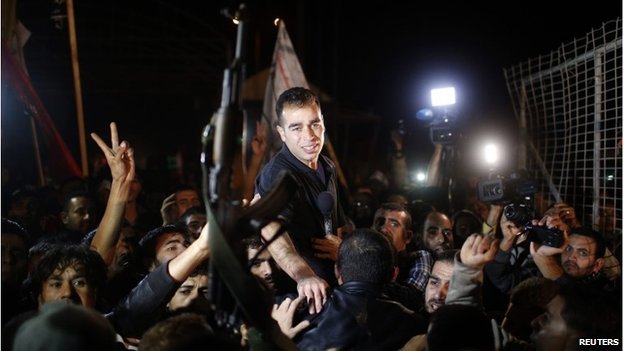
The second of four batches of 26 Palestinian prisoners have been released in Israel as part of a deal for the resumption of peace talks.
Five prisoners were released in Gaza, while the other 21 were sent to the West Bank.
Those freed were all convicted of murders and had spent between 19 and 28 years in prison.
Israeli and Palestinian officials resumed direct talks in Jerusalem in August after a three-year hiatus.
Those who have been freed are seen there as political prisoners and heroes of the Palestinian cause – but that the decision has been hugely unpopular with the Israeli public.
The Palestinians released early on Wednesday were driven from Israel’s Ofer prison to the Erez crossing into Gaza and the Beituna crossing into the West Bank.
In Gaza, fireworks shot into the sky as the former inmates were driven away in a convoy. In the West Bank, the freed prisoners were taken to Ramallah, where Palestinian President Mahmoud Abbas addressed a large crowd.

Mahmoud Abbas said the next batch of prisoners would be released in two months, and called for all Palestinians to be freed.
“There will be no final agreement without the release of all the prisoners,” he said.
He also denied rumours that the deal for the prisoner release had been made on the understanding that Israel could continue building settlements.
The release has caused tensions within Israel’s governing coalition, with far-right parties trying and failing to stop it going ahead.
Shortly after the prisoners were freed, Israeli media reported that the government had announced that it would build 1,500 new homes in the east Jerusalem settlement of Ramat Shlomo.
The move was seen as an effort to mollify government hardliners. Talks between Israel and the Palestinians were suspended in 2010 after an Israeli freeze on settlement construction expired.
The longest serving prisoner, Isa Abed Rabbo, was convicted of murdering two students while they were hiking south of Jerusalem in October 1984.
A list of the prisoners was published 48 hours before the releases, to allow victims’ families to appeal to the Israeli Supreme Court against the freeing – but the Supreme Court rejected an appeal by an organisation for bereaved families.
There have been large protests in Israel in recent days. Demonstrators on Wednesday held signs that read “death to murderers”.
Conditions over freedom of movement are often attached to prisoner releases by Israel but these have sometimes been broken in the past, with freed Palestinians being rearrested, our correspondent says.
The first batch of Palestinian prisoners was freed in Gaza and the West Bank on August 14.
[youtube H5qHfEUdZZk 650]